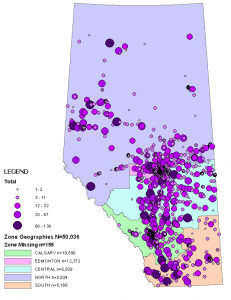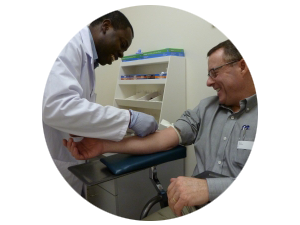Welcome!
What’s new?
The HEALthy Eating & Supportive Environments study has launched! For more information, please go to HEAL (diet and physical activity study) – Alberta’s Tomorrow Project.
Our Lung Cancer Risk Factors study continues! For more information, please go to Lung Cancer Risk Factors Study – Alberta’s Tomorrow Project (myatp.ca).
If you would like to update your information, please visit our contact page. Staying in touch with our participants is critical to the study’s success. Thank you!
Who We Are
In 2001, hundreds of men and women in Alberta began to join the largest health study ever undertaken in the province. Alberta’s Tomorrow Project was born, and in the years since has achieved a participant community of 55,000. Many of our recruits have stories of cancer within their own families, while others simply believe in the value of scientific discovery to reduce the incidence of debilitating disease in decades to come.
Signing up between the ages of 35 and 69, the participants have generously donated their time to fill out extensive and detailed questionnaires about their lifestyle habits and health history: what they eat, how much they exercise and sleep, prevalence of disease in their family, which screening tests they’ve had, the breadth of their social network, and more. Most have also given blood, saliva, and urine samples, so their biological specimens can be analyzed and compared by researchers.
 If participants couldn’t come to us, we went to them. More than 140 mobile study centres were set up in conference centres, churches, hotels and other community meeting places, to ensure broad representation of the province’s diverse population.
If participants couldn’t come to us, we went to them. More than 140 mobile study centres were set up in conference centres, churches, hotels and other community meeting places, to ensure broad representation of the province’s diverse population.
It’s a long-term relationship, one that will unfold over the next several decades. Our participants have agreed to stay with the project and to regularly update us through follow-up surveys on their habits and state of health.
In the meantime, there is much information ready to be examined immediately, by our own scientists and those from educational and research institutions across Canada, and around the world. Links between sleep patterns and obesity, physical activity and stress, social support and illness – and more – can be explored thanks to the vast database already in hand.
Alberta’s Tomorrow Project would like to thank participants for their dedication and commitment.
Their willingness to take part will help researchers tackle these challenging questions at lower cost, in less time, and by virtue of our number strength, with more certain conclusions. As a result, scientists will gain better insight into what causes cancer and chronic diseases, to reduce their considerable burden through better prevention and treatment in the future.
